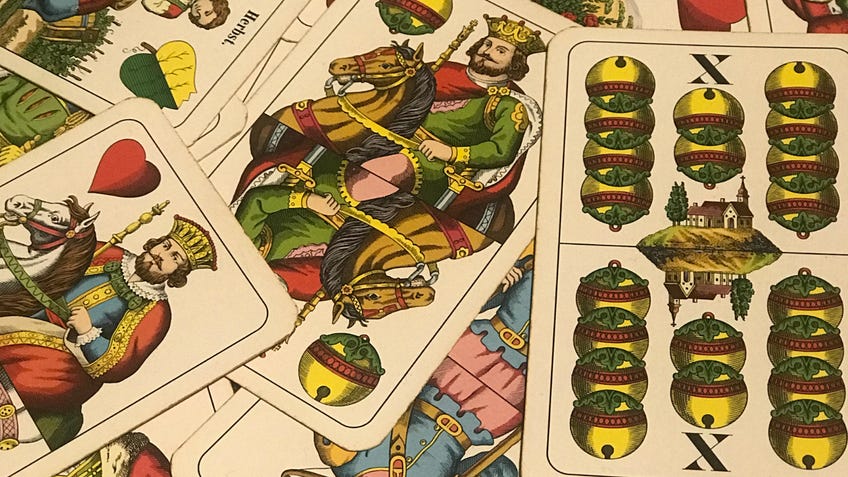Schnapsen: the Austrian card game that healed a grieving family
A gaming gift through the generations.
I am very blessed to have loving parents. They supported me throughout my childhood and made sure to give me the best possible chance at a great life. They came to all of my school shows, gave my friends snacks when they came over to play games and didn’t laugh at me when I needed help straightening my emo fringe - at least not to my face, anyway.
When it came to emotional support, however, that was very much left to my mum. She chose to stay at home and look after my brother and me, so my dad worked long hard shifts to both pay the bills and support my ever-expanding arsenal of extra-curricular activities, ranging from badminton to ballet. When it came to conversation, Dad and I would mostly speak about three things: football, politics (the less said about that the better) and beer. Everything else - troubles at school, the trials of being a teenager etc - was left to my mum.
This all changed in 2017, when my grandad started losing his battle with cancer.
Leopold Weber, affectionately called Leo, moved to the UK from Austria in the 1950s and worked in the same hotel in my small town for over 50 years. He was an incredibly kind and well-kept man who was abnormally strong for his age, but when he was diagnosed with Stage-4 bowel cancer, things were never the same. That once-mighty man was now being hollowed out by this vicious disease, and it started taking its toll on the family. At the same time, I was personally suffering; I had just left university, quit a guaranteed job in pursuit of a failing music career and was haemorrhaging money.

Tensions were high, with my increasingly erratic mood clashing against my family who were trying to keep the severity of my grandad’s illness away from my fragility. I broke. At this point, my dad broke our three topic discussion rule and asked me a simple question: "Fancy a game of Schnapsen?"
Schnapsen is Austria’s national card game, beloved by families across the country. Unlike most card games you play with your grandparents, Schnapsen is less about the luck of the draw and more about outsmarting the person opposite you. When given your first hand of five cards, you have to take your time to think about how your opponent would counter your moves, rather like chess.
Cards are played one at a time, similarly to Uno, so a player needs to think as much about what their opponent could be holding as their own cards, in case a card can be beaten with a higher-value play. There are some unique tricks players can deploy, such as showing a King and Ober (Queen) together for an instant 20 card points (or 40 if the pair are in the predetermined trump suit), but these plays come with perils. Once you show a pair, you have to always place the King down. If your opponent wins that hand, and you haven’t yet taken a trick, not only does your mound of card points mean nothing, but your opponent now has a better idea of the cards you’re holding.
Schnapsen is less about the luck of the draw and more about outsmarting the person opposite you.
This is the position I find myself in constantly when playing against my dad, who is a more cerebral player compared to my aggressive approach. For every 40 card-point start I would flash confidently like an idiot, he would smirk and instantly counter. However, when he sat on a high card waiting for the right moment, I would usually attack his position and force him out of his strategy. With such a limited card pool, games happen at a lightning pace. It is this blend of strategy, dynamism and constant ebb and flow that makes Schnapsen so magnetic.
And so my dad and I ventured forth to the nearest Wetherspoons, sat down with a pint and started a game. The trump card is revealed: a Ten of Acorns. I notice immediately I’m holding the Ober and King of Acorns, which played together are an instant 40 points as long as I can take a trick. Sorted. I flex my muscles, show both cards and place the King onto the table, thinking there’s no way he can win this trick. My dad flashes a wry smile and places a Deuce atop my Ober. Shit. My 40 points don’t count and my dad is up by 14. Now he’s purring. He flashes an Ober and King of Leaves for an instant 20 points (as Leaves aren’t the trump suit) and places the King. Though I have a trump card, I am also holding the Unter of Leaves - which I have to play even though it’s a losing hand. My dad is now up by 40 points. It’s panic stations. Thankfully, he places a cocky Ten of Bells which I counter with the Deuce. Not only do I gain a lofty 21 points, but my previous 40 now count; I am sitting pretty on 61 points. I take the next trick and win the first game point. A rollercoaster of emotions in just under two minutes.
The games flowed easily, with the points passing evenly between us. This was never the case when we played against my grandad, who would always annihilate both of us. It was the game he taught my dad, who then taught me, after all.
Schnapsen acted not as a distraction to painful conversations, but as a bridge to help us open up to one another in a way that wouldn’t normally be possible.
Once we fell into the rhythm of the game, decisions started to become instinctive. This freed our minds. This is when my dad opened up about the severity of Grandad’s illness, and I about the hopelessness I was feeling. Schnapsen acted not as a distraction to painful conversations, but as a bridge to help us open up to one another in a way that wouldn’t normally be possible. I was told stories about Grandad I had never heard before; how loved he was, how respected he was. The story of a brilliant man’s life.
Leo passed away peacefully not long after this conversation. Once we moved past the formalities of grief, my dad and I ventured back to that run-down Wetherspoons to play a game of Schnapsen, sharing more stories of the man who left us the greatest possible gifts: a highly addictive Austrian card game, and each other.

